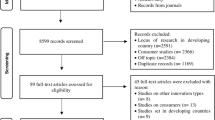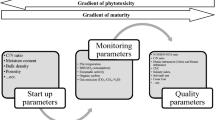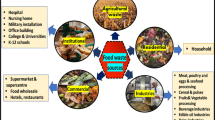Abstract
Today, the understanding of environmental concerns is of great significance, making it desirable for children to investigate the scientific concepts underlying a growing list of emerging environmental issues. This paper deals with young children’s preconceptions. The authors have stressed the importance of investigating children’s ideas at an early stage, with some of these ideas leading to knowledge far removed from scientific knowledge. Our study focused on the knowledge about organic matter processes among five-year-old children who were only exposed to informal learning within the context of home waste management. We used semi-structured interviews with 48 young children to determine their knowledge about the organic matter cycling in composters. The determination of five significant stages for a global understanding of the cycle of organic matter and the construction of three levels of formulation have allowed us to conclude that young children are able to understand scientific processes involved in composting in the context of their family practice of organic waste management.













Similar content being viewed by others
References
AJBD, CITEXIA, ADEME. (2018). Synthèse : Etude technico-économique de la collecte séparée des biodéchets. La Librairie ADEME. https://librairie.ademe.fr/dechets-economie-circulaire/1453-etude-technico-economique-de-la-collecte-separee-des-biodechets.html.
Allen, M. (2014). Misconceptions in Primary Science. McGraw Hill Education.
Andersson, B. (1990). Pupils’ conceptions of matter and its transformations (age 12–16). Studies in Science Education, 18(1), 53–85. https://doi.org/10.1080/03057269008559981
Astolfi, J.-P. (1987). Approche didactique de quelques aspects du concept d’écosystème. Introduction. Aster, 3, 11–18. https://doi.org/10.4267/2042/9185
Astolfi, J.-P., & Peterfalvi, B. (1993). Obstacles et construction de situations didactiques en sciences expérimentales. Aster, 16, 103–141. https://doi.org/10.4267/2042/8578
Barr, S. (2007). Factors influencing environmental attitudes and behaviors. A UK case study of household waste management. Environment and Behavior, 39(4), 435–473. https://doi.org/10.1177/0013916505283421
Black, P.J., & Lucas, A.M. (1993). Children’s Informal Ideas in Science. Routledge Falmer.
Brousseau, G. (1997). Theory of Didactical Situations in Mathematics: Didactique Des Mathématiques, 1970–1990. Kluwer Academic Publishers.
Brundtland, G. (1987). Our Common Future: The World Commission on Environment and Development. Oxford University Press.
Danic, I., Delalande, J., & Rayou, P. (2006). Enquêter auprès d’enfants et de jeunes : objets, méthodes et terrains de recherche en sciences sociales. Presses Universitaires de Rennes.
Davis, J. M. (2010). Young children and the environment: Early education for sustainability. Cambridge University Press.
De Vecchi, G. (1994). Elaborer des « niveaux de formulation » en prenant en compte les conceptions des apprenants. In A. Giordan, Y. Girault, & P. Clément (Eds.), Conceptions en connaissances (pp. 251–264). Peter Lang.
Delserieys, A., Jegou, C., Boilevin, J.-M., & Ravanis, K. (2018). Precursor model and preschool science learning about shadows formation. Research in Science and Technological Education, 36(2), 147–164. https://doi.org/10.1080/02635143.2017.1353960
Durkheim, E. (1922). Education et sociologie. Presses Universitaires de France.
Ergazaki, M., Zogza, V., & Grekou, A. (2009). From preschoolers’ ideas about decomposition, domestic garbage fate and recycling to the objectives of a constructivist learning environment in this context. Review of Science, Mathematics and ITC Education, 3(1), 99–121.
Gomes, J., & Fleer, M. (2019). The development of scientific motive: how preschool science and home play reciprocally contribute to science learning. Research in Science Education, 49, 613–634. https://doi.org/10.1007/s11165-017-9631-5
Goodnow, J. J. (1992). Parents’ ideas, children’s ideas: Correspondence and divergence. In I. E. Siegel, A. V. McGillicuddy-DeLisi, & J. J. Goodnow (Eds.), Parental belief systems: The psychological consequences for children (pp. 293–317). Erlbaum.
Grodzinska-Jurczak, M., Stepska, A., Nieszporek, K., & Bryda, G. (2006). Perception of environmental problems among pre-school children in Poland. International Research in Geographical and Environmental Education, 15(1), 62–76. https://doi.org/10.2167/irgee187.0
Haug, R. T. (1993). The practical handbook of compost engineering. Lewis.
Hellden, G. (1995). Environmental education and pupils’ conceptions of matter. Environmental Education Research, 1(3), 267–277. https://doi.org/10.1080/1350462950010302
IFOP. (2016). La sensibilité des français à la prévention des déchets. Résultats d’enquête de septembre 2015. https://www.ademe.fr/sensibilite-francais-a-prevention-dechets.
INSEE. (2020). Dossier complet - commune de Rennes (35238). INSEE. https://www.insee.fr/fr/statistiques/2011101?geo=COM-35238.
Kaga, Y. (2008). Early childhood education for a sustainable world. In I. Pramling Samuelson & Y. Kaga (Eds.) The contribution of early childhood education to a sustainable society. UNESCO, Australia. pp: 53–56
Kambouri, M. (2016). Investigating early years teachers’ understanding and response to children’s preconceptions. European Early Childhood Education Research Journal, 24(6), 907–927. https://doi.org/10.1080/1350293X.2014.970857
Leach, J., Driver, R., Scott, P., & Wood-Robinson, C. (1996). Children’s ideas about ecology 2: Ideas found in children aged 5–16 about the cycling of matter. International Journal of Science Education, 18(1), 19–34. https://doi.org/10.1080/0950069960180102
Lhoste, Y., Peterfalvi, B., & Decussy, C. (2010). Expérience de la problématisation et obstacles chez des élèves de sixième. Recyclage de la matière organique dans le sol. In M. Fabre, A. Dias de Carvalho & Y. Lhoste (Eds.) Expérience et problématisation en éducation. Aspects philosophiques, sociologiques et didactiques (pp.157–180). Afrontamento.
Ministry for Ecological and Inclusive Transition. (2015). Loi n° 2015–992 du 17 août 2015 relative à la transition énergétique pour la croissance verte. Légifrance. https://www.legifrance.gouv.fr/jorf/id/JORFTEXT000031044385.
Musser, L. M., & Diamond, K. E. (1999). The children’s attitudes toward the environment scale for preschool children. The Journal of Environmental Education, 30(2), 23–30. https://doi.org/10.1080/00958969909601867
Palmer, J. A., Grodzinska-Jurczak, M., & Suggate, J. (2003). Thinking about waste: Development of English and Polish children’s understanding of concepts related to waste management. European Early Childhood Education Research Journal, 11(2), 117–139. https://doi.org/10.1080/13502930385209201
UNESCO. (1997). Educating for a Sustainable Future: A Transdisciplinary Vision for Concerted Action. UNESDOC. https://unesdoc.unesco.org/ark:/48223/pf0000110686.
Vining, J., & Ebreo, A. (1992). Predicting recycling behavior from global and specific environmental attitudes and changes in recycling opportunities. Journal of Applied Social Psychology, 22(20), 1580–1607. https://doi.org/10.1111/j.1559-1816.1992.tb01758.x
Acknowledgements
This work constitutes part of a PhD funded by the French Environment and Energy Management Agency (ADEME) and conducted by Valerie Marchal-Gaillard at the CREAD educational research laboratory in the University of Western Brittany (France). The authors sincerely thank the local education authorities (Inspections Académiques) in Rennes and Tours for their support. They are also grateful to the children, parents and school staff who participated in the study on which this paper is based. Our gratitude extends to Konstantinos Ravanis, Professor at the University of Patras, for his comments on an earlier draft.
Funding
The PhD research from which this paper is based is supported by ADEME under Grant TEZ17-32.
Author information
Authors and Affiliations
Corresponding author
Ethics declarations
Conflict of interest
No potential conflict of interest was reported by the authors.
Additional information
Publisher's Note
Springer Nature remains neutral with regard to jurisdictional claims in published maps and institutional affiliations.
Rights and permissions
About this article
Cite this article
Marchal-Gaillard, V., Marzin-Janvier, P., Boilevin, JM. et al. Contribution of Early Childhood Education to a Sustainable Society: Influences from Home in Preschool Children’s Understanding of Composting in France. Early Childhood Educ J 50, 1247–1261 (2022). https://doi.org/10.1007/s10643-021-01260-8
Accepted:
Published:
Issue Date:
DOI: https://doi.org/10.1007/s10643-021-01260-8




